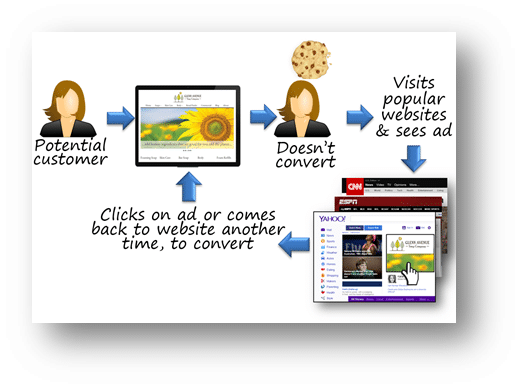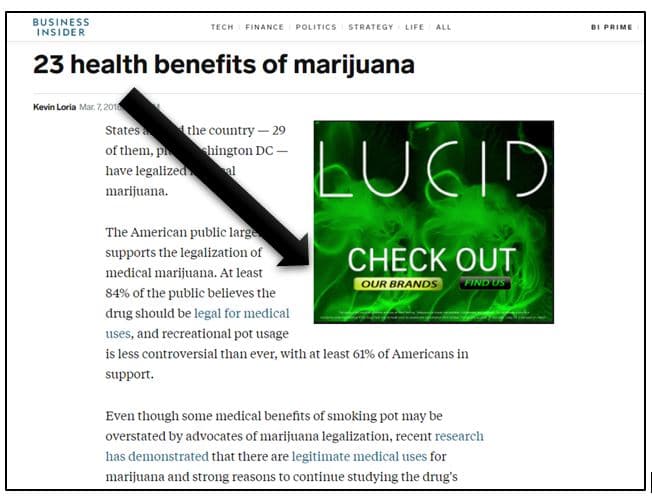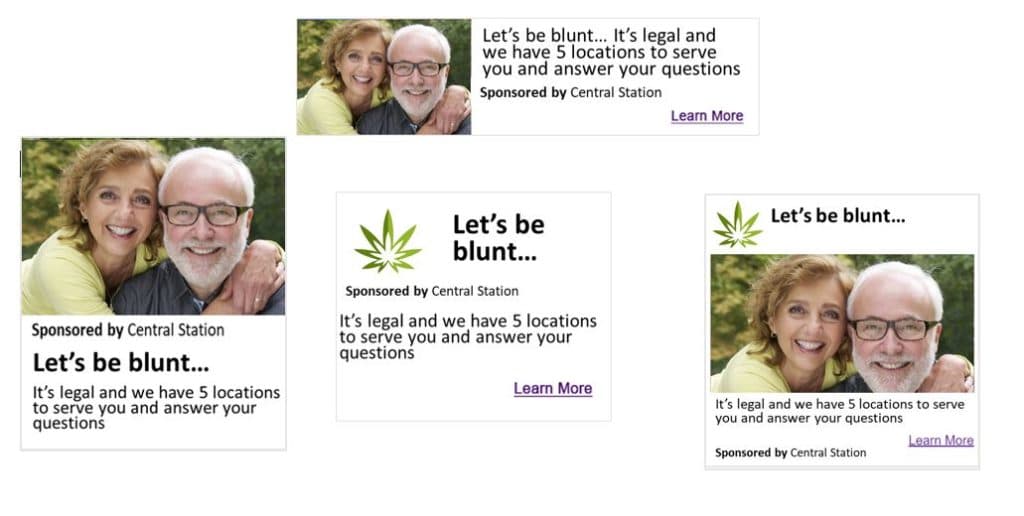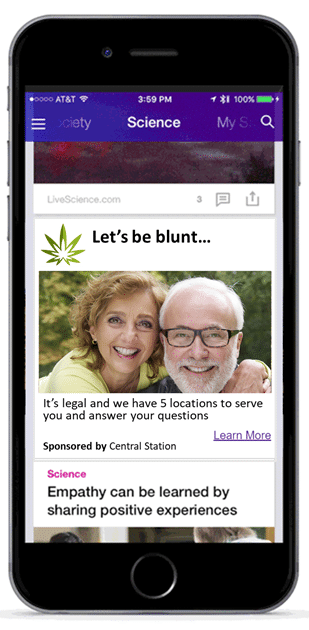Blaze. Burn. Get baked. Ganja. Smoke bud. 4/20. Hash. Wake n’ Bake. There are definitely more terms that refer to cannabis than there are ways to advertise for it. In an industry that’s seen massive growth and expansion, there are constant uphill battles when it comes to finding out what’s a possibility and what’s not in the marketing world. It’s not easy to uncover what is available to promote your cannabis company, but despite traditional media and digital media roadblocks, there are a lot of opportunities.
Digital advertising is a great tool for cannabis marketers, but you have to know what products are and are not allowed and what rules you have to follow on each platform. The two big players in the digital world that don’t allow Cannabis Advertising are Facebook and Google. Here are just a few facts about these platforms:
- Google abides by federal law, and under federal law the selling and manufacturing of cannabis is not allowed.
- Facebook falls into the same category, since it’s governed by federal law.
- Even if your state allows the legal sale of marijuana, these platforms do not allow cannabis, which they consider similar to tobacco products.
- Facebook has just started allowing CBD oil but only on a case by case basis.
So, with two of the biggest players out of the game when it comes to promoting your cannabis business, what’s left? Here are a few products are you allowed to market cannabis products with:
Retargeting – Simply put, retargeting is following people after they leave your website and showing them your display or video ad, across all devices. Retargeting is one of the foundations of digital marketing. When people come to your website, you want the opportunity to stay in front of them. They found you for a reason. Retargeting gives you that opportunity. Here’s a quick diagram to show you how it works:

Let’s say you have a potential customer that comes to your website. But, they don’t convert. We can drop a tracking cookie on that user so when they leave your site and visit other sites, we now have the ability to show your ad. This is important because 98% of people don’t convert the first time they come to your website. Placing your ad in front of them keeps you top of mind.
Next on the list is Keyword Targeting. Keyword targeting is showing your display or video ads on web pages that contain keywords related to your business, across all devices. These ads will look like your normal display/banner ads that you see on websites. Here’s an example:

One of the benefits of keyword targeting is being able to target people that are searching for what you offer. For instance, you can target keywords like “marijuana legalization” or “cannabis.” This way, if someone is visiting a website that contains those keywords, your ad could appear. We can target up to 500 keywords that may include sufferers’ symptoms, names of products, or targeting people researching the local law and legalization.
Artificial Intelligence (AI) is next. In its simplest form, AI is showing your display or video ads to people across all devices, using machine learning to target consumers based on who is engaging with the ad.
AI is a growing technology that uses the machine learning to find similar people to those that interact with your ad. You know that saying, “Birds of a feather flock together?” AI is finding those other birds that look like people currently clicking and converting on your ads.
Here’s a diagram as to how it works:

Another product that is beneficial (and legal) to use to promote cannabis: Behavioral Targeting. With Behavioral targeting, you are showing your display or video ads to specific consumers based on their previous online behavior, across all devices. Everything we do online gets tracked, where we click, how long we’re on a site, what we search for etc. All of this information gets compiled and places us in different behavioral categories, which we then use to target your ads.
Here are some behavioral categories that may make sense for your company:
Alternative Medicine
Age
Arthritis
Back/Neck Pain
Cancer
Chronic Pain
Cigarettes
College Students
Concert Goers
Farming and Agriculture
Feminine Pain
Gamers
Green Living
Healthy Living
Headaches/Migraines
Live Event Attendees
Marijuana Interest
Marijuana Legalization Advocates
Music Festivals
And so many more!
In a lot of instances, businesses will use a combination of some of the above products within one ad campaign. A combination of Behavioral, Artificial Intelligence, Retargeting, and Keyword advertising allows you to target your potential customers in several ways, from different angles.
Another popular method to use to promote cannabis is Native Advertising. Native Ads currently make up 63% of ad spending, according to eMarketer. These ads typically get higher click-throughs and are not blocked by ad blockers.
What is a Native Ad? Native display or video ads, go across all devices and match the look, feel, and visual context of the website or app where they are seen. Basically, they are ads that don’t look like ads. What is great about Native Ads, is that you can use the same methods we talked about earlier (Behavioral, Artificial Intelligence, Retargeting, and Keyword) to deliver your message, delivered in hundreds of different formats, such as:

While they may look like just a banner ad in the examples above when they are placed on your behalf, they blend into the content that they are being delivered:

These ads are meant to blend in with the content that the user is reading.
A hot advertising method right now is video advertising. There are so many ways to use video. In fact, in all methods mentioned above, you have the ability to utilize display or video in your strategy. So, available to you are AI Pre-Roll, Native Video, Behavioral Pre-Roll, Retargeting Pre-Roll, and Keyword Pre-Roll, as well as OTT Targeting. OTT, simply put, is Over The Top video programming transmitted via the internet, not on traditional cable or broadcast. Think of Roku, Smart TVs, Fire TV Sticks, XBOX, PlayStation, ChromeCast, and more. With OTT, you have the ability to get your ad to thousands of publishers and streaming exchanges on stations like Sling TV, Fubo.TV and channels like ESPN, FOX, NBA, NBC, and more!
OTT allows you to target with Behavioral Categories and with Artificial Intelligence. We’ve mentioned both of these before, but here are some categories available with this product:
Age
Active Military
College Students
Concert Goers
Craftsman/Blue Collar
Gamers
Health & Fitness Enthusiasts
Military Veteran
Music Festivals
Natural Health Products
OTC Pain Medicine Users
Outdoor Enthusiasts
And many more!
One thing to be careful is how limited OTT inventory is, so we recommend running it combined with video-pre-roll for maximum reach. Using the Behavioral Categories and AI together to target your campaign is also a recommended best practice.
Lastly, a product that can be used by almost every industry is Live Chat. If you’re looking for a way to get more leads by engaging your prospects with a chatbox and text-to-chat on your website, this is your answer. Monitored 24/7 by LIVE people, you now have an opportunity to speak with your potential customers as they’re browsing your website. While they can’t possibly be as well versed in your industry as you are, having them prepared to answer basic common questions, know the store hours, or if there are special promotions you’re running will allow them the chance to speak with your potential customers and gather their contact info so you can reach out and connect.
Who doesn’t want to be able to talk to their customers 24/7?!
One final thing to keep in mind once you pick the tool is the demographic right for your business. The key to any good digital marketing is strong targeting, so understanding why people are interested in cannabis will help promote your business. As you can see below, many adults use cannabis to help them with medical ailments:

Here’s an extensive list of ways that you could target for the cannabis industry (all of which could be targeted for Native/Display/Video):
Headaches/Migraines
Pain Relievers > Headache/Pain Reliever
Headache and Migraine
Headache & Migraine Medications
Headache and Migraine Sufferers
Back/Neck Pain
Back Pain
Back Pain Medications
Back Pain Sufferers
Head & Neck Surgery
Arthritis
Arthritis Symptoms
Arthritis Prescription
Arthritis
Osteoarthritis
Rheumatoid Arthritis Medications
Daily Aspirin Therapy
Rheumatoid Arthritis
Arthritis Medications
Arthritis Sufferers
Arthritis and Bones
Arthritis, Moderate to Severe
Psoriatic Arthritis
Feminine Pain
Menstrual Period & Ovulation
Menstrual Cramp Relief
Feminine Care
Feminine Products
Feminine Needs
General Aches and Pains
Pain Relievers
Chronic Pain
Pain Therapy
Pain Relief
Health
Alternative Medicine
Inability to Fall Asleep
Sleep Disorders
Sleep Aids
Sleep Medicine
Sleep Issues
Nighttime Sleeplessness
Treatment – Insomnia
Insomnia Sufferer
Insomnia Relief
Cancer Pains
Cancer
Smoking Cessation
Smoking Cessation
Smoking Cessation Intenders
Smoking Addiction
Quit Smoking
Has Tried To Give Up Smoking In Last 12 Months
Trying to Quit Smoking
As you can tell, there are a lot of ways to promote the cannabis industry. These are just a few of the top tools and targeting that we suggest. Be sure to consult your local laws and understand what opportunities await your growth!
“Cannabis brands will push the limits of what’s possible in ad targeting – and everybody wins. Cannabis, legal in a growing number of states for medicinal and recreational purposes, faces specific regulatory obstacles that programmatic advertising techniques address. Cannabis products from edibles and topicals to beverages will use data-driven targeting to the best of the programmatic ecosystem’s ability and automated buying will play an essential role in the growth of this controversial ad category. Programmatic will show advertisers how to reach the right audience at the right time while still navigating a thicket of legal peril, brand safety, ad fraud, consumer privacy rights, and regulation that surrounds this nascent and controversial ad category. For the cannabis market and community to grow, advertisers have to get it right – and the fruits of their labor will help all advertisers be better.”
